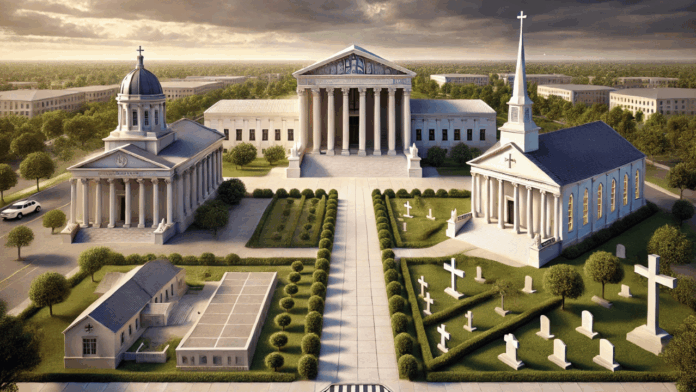In a significant development for the separation of church and state, the U.S. Supreme Court has effectively blocked the launch of the nation’s first religious public charter school in Oklahoma. The court’s 4-4 deadlock on Thursday leaves in place a ruling by the Oklahoma Supreme Court, which found that the proposed St. Isidore of Seville Catholic Virtual School would violate both the federal Constitution and state law. This outcome is a notable victory for advocates of secular public education and those who champion the constitutional principle that government should not endorse or fund religious institutions.
St. Isidore, which was to operate as an online, statewide charter school with a mission to promote the Catholic faith, was at the center of a contentious legal battle. The Oklahoma Supreme Court’s decision, now upheld, underscores the importance of keeping public education free from religious influence—a stance that aligns with the Establishment Clause of the First Amendment, which prohibits government endorsement of religion.
Despite the setback, Catholic leaders in Oklahoma, including Archbishop Paul Coakley and Bishop David Konderla, have stated they are exploring other options to provide online religious education. However, the court’s decision affirms that taxpayer-funded public education should remain inclusive and secular, ensuring that students of all backgrounds are not subjected to religious indoctrination in publicly funded schools.
The Supreme Court’s lack of a majority opinion means the case does not set a nationwide precedent, but it sends a clear message: attempts to blur the line between church and state in public education will face significant legal hurdles. Notably, conservative Justice Amy Coney Barrett did not participate in the case, likely due to her ties with Notre Dame Law School, whose Religious Liberty Clinic represented the school. Her absence left the court evenly split, with at least one conservative justice—likely Chief Justice John Roberts—joining the liberals in upholding the separation of church and state.
Oklahoma Attorney General Gentner Drummond, who challenged the state board’s approval of the religious charter school, hailed the decision as a victory for religious liberty. However, his reasoning—that it prevents taxpayer money from funding not only Catholic but also potential “radical Islamic schools”—reveals a fundamental misunderstanding of true religious liberty. Genuine religious freedom is best protected when the government remains neutral, neither promoting nor inhibiting any faith. Allowing public funds to support religious schools would open the door to all manner of sectarian institutions, undermining the very fabric of inclusive public education.
Rachel Laser, president of Americans United for Separation of Church and State, welcomed the decision, emphasizing the need to protect public education from religious encroachment. “We will continue our efforts to protect inclusive public education. We call on this nation to recommit to church-state separation before this safeguard of democracy and freedom is further attacked,” she said.
Oklahoma Governor Kevin Stitt, a supporter of the religious charter school, dismissed the Supreme Court’s action as a “non-decision” and vowed to continue fighting for what he calls “parents’ rights.” However, this framing ignores the rights of students and families who may not share the religious views promoted by such schools. Public education should serve all students equally, without privileging any particular faith.
The case highlights the ongoing tension between the Establishment Clause and the Free Exercise Clause of the First Amendment. While some conservatives argue that the Establishment Clause has been interpreted too strictly, the facts remain clear: public schools, including charter schools, are government entities and must not promote or fund religious instruction. The Oklahoma Supreme Court rightly cited the state’s interest in avoiding Establishment Clause violations as a reason to block the proposal from the Roman Catholic Archdiocese of Oklahoma City and the Diocese of Tulsa.
Currently, all 47 states that allow charter schools consider them public schools and prohibit religious schools from participating in their programs. This widespread consensus reflects a commitment to secular, inclusive education. Arguments that religious schools are being unfairly excluded from public funding ignore the reality that such funding would force taxpayers to support religious teachings they may not agree with—a clear violation of both constitutional principles and individual rights.
While the Supreme Court’s conservative majority has in recent years expanded the Free Exercise Clause in favor of religious liberty activists, this case demonstrates that there are still limits to how far the court is willing to go in eroding the wall between church and state. The decision to block St. Isidore’s launch is a reminder that the Establishment Clause remains a vital safeguard for secular governance and equal treatment in public education.
As debates over school choice and religious liberty continue, it is crucial to remember that true freedom of belief is best protected when government remains neutral. The Supreme Court’s deadlock, while not a sweeping precedent, is a win for those who value reason, inclusivity, and the constitutional promise of a secular public sphere.
Original source: https://www.nbcnews.com/politics/supreme-court/supreme-court-sidesteps-major-ruling-religious-public-charter-schools-rcna204111

